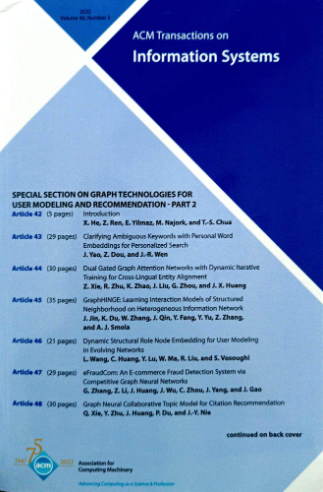POI推荐的扩散模型
IF 5.4
2区 计算机科学
Q1 COMPUTER SCIENCE, INFORMATION SYSTEMS
引用次数: 2
摘要
下一个兴趣点(POI)推荐是基于位置的服务中的一项关键任务,旨在为用户的下一个目的地提供个性化建议。先前关于POI推荐的研究主要集中在用户空间偏好的建模上。然而,现有的利用空间信息的工作仅基于用户以前访问过的位置的汇总,这阻碍了模型在新区域推荐poi。在许多情况下,基于位置的方法的这种特性会损害模型的性能。此外,将顺序信息整合到用户的空间偏好中仍然是一个挑战。在本文中,我们提出了diffi -POI:一个基于Diffu的模型,它对用户的空间偏好进行采样,以推荐下一个POI。受扩散算法在分布采样中广泛应用的启发,diffi - poi采用两个定制的图编码模块对用户的访问序列和空间特征进行编码,然后采用基于扩散的采样策略来探索用户的空间访问趋势。我们利用扩散过程及其反向形式从后验分布中抽样,并优化相应的分数函数。我们设计了一个联合训练和推理框架来优化和评估所提出的Diff-POI。在四个真实世界POI推荐数据集上进行的大量实验表明,我们的diffi -POI优于最先进的基线方法。对Diff-POI的进一步消融和参数研究揭示了所提出的基于扩散的采样策略的功能性和有效性,以解决现有方法的局限性。本文章由计算机程序翻译,如有差异,请以英文原文为准。
A Diffusion model for POI recommendation
Next Point-of-Interest (POI) recommendation is a critical task in location-based services that aim to provide personalized suggestions for the user’s next destination. Previous works on POI recommendation have laid focus on modeling the user’s spatial preference. However, existing works that leverage spatial information are only based on the aggregation of users’ previous visited positions, which discourages the model from recommending POIs in novel areas. This trait of position-based methods will harm the model’s performance in many situations. Additionally, incorporating sequential information into the user’s spatial preference remains a challenge. In this article, we propose Diff-POI : a Diffu sion-based model that samples the user’s spatial preference for the next POI recommendation. Inspired by the wide application of diffusion algorithm in sampling from distributions, Diff-POI encodes the user’s visiting sequence and spatial character with two tailor-designed graph encoding modules, followed by a diffusion-based sampling strategy to explore the user’s spatial visiting trends. We leverage the diffusion process and its reverse form to sample from the posterior distribution and optimized the corresponding score function. We design a joint training and inference framework to optimize and evaluate the proposed Diff-POI. Extensive experiments on four real-world POI recommendation datasets demonstrate the superiority of our Diff-POI over state-of-the-art baseline methods. Further ablation and parameter studies on Diff-POI reveal the functionality and effectiveness of the proposed diffusion-based sampling strategy for addressing the limitations of existing methods.
求助全文
通过发布文献求助,成功后即可免费获取论文全文。
去求助
来源期刊

ACM Transactions on Information Systems
工程技术-计算机:信息系统
CiteScore
9.40
自引率
14.30%
发文量
165
审稿时长
>12 weeks
期刊介绍:
The ACM Transactions on Information Systems (TOIS) publishes papers on information retrieval (such as search engines, recommender systems) that contain:
new principled information retrieval models or algorithms with sound empirical validation;
observational, experimental and/or theoretical studies yielding new insights into information retrieval or information seeking;
accounts of applications of existing information retrieval techniques that shed light on the strengths and weaknesses of the techniques;
formalization of new information retrieval or information seeking tasks and of methods for evaluating the performance on those tasks;
development of content (text, image, speech, video, etc) analysis methods to support information retrieval and information seeking;
development of computational models of user information preferences and interaction behaviors;
creation and analysis of evaluation methodologies for information retrieval and information seeking; or
surveys of existing work that propose a significant synthesis.
The information retrieval scope of ACM Transactions on Information Systems (TOIS) appeals to industry practitioners for its wealth of creative ideas, and to academic researchers for its descriptions of their colleagues'' work.
 求助内容:
求助内容: 应助结果提醒方式:
应助结果提醒方式:


